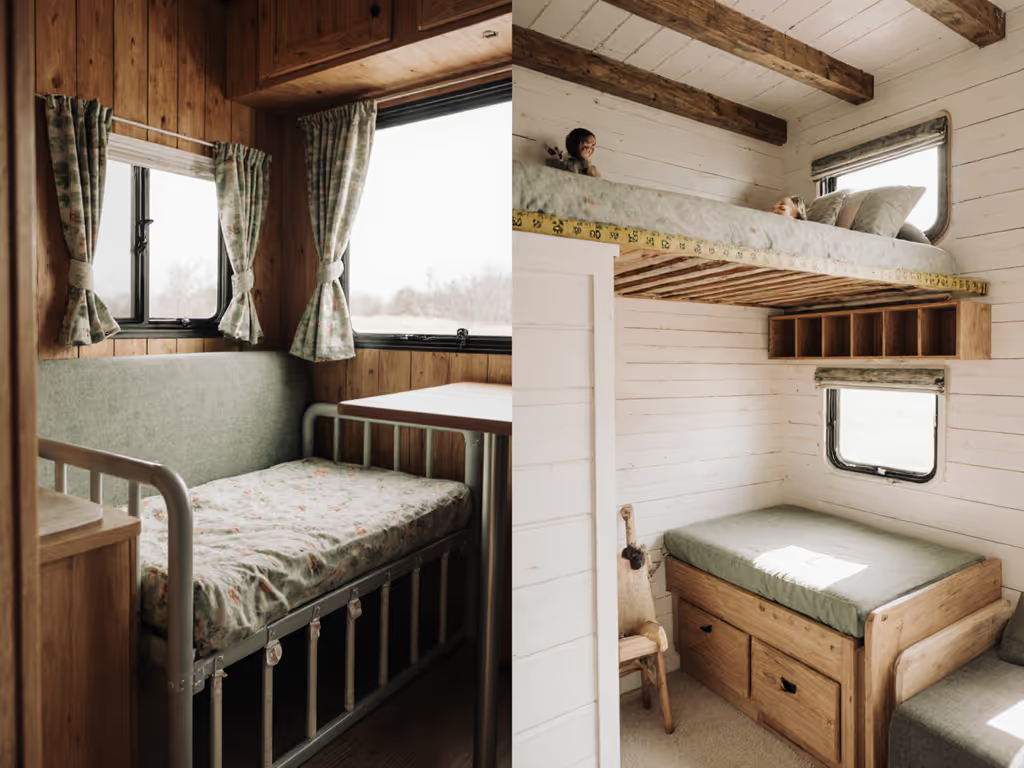
Space-Saving Toddler Beds for Small Bedrooms: Top 5 Picks
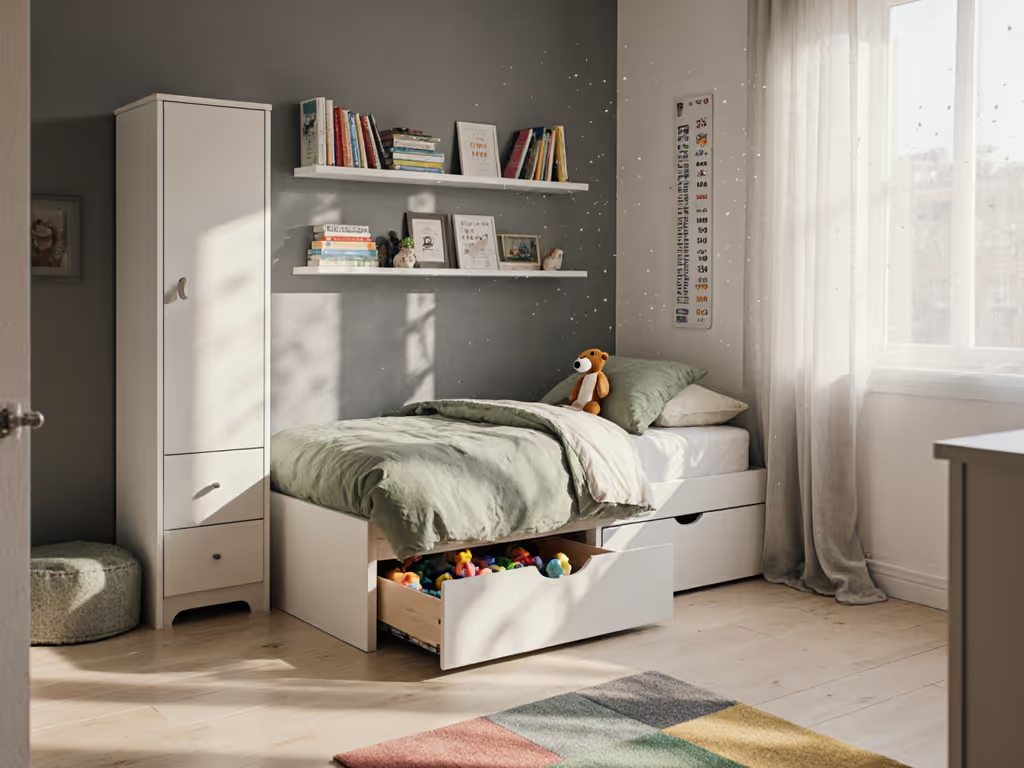
If your toddler's bedroom feels more like a closet than a sanctuary, you're not alone. As a parent educator who's helped hundreds of families transform cramped quarters into calm sleep spaces, I know how space saving toddler beds can be the difference between nightly battles and peaceful transitions. Small room toddler beds aren't just about physical dimensions (they're about creating an environment where toddlers feel empowered rather than confined). Through careful observation of how children interact with their surroundings, I've seen time and again that small changes in space create big changes in sleep. When our daughter transformed from nightly protester to independent sleeper after we swapped her tall crib for a floor bed with accessible pajamas, it cemented my belief that environment teaches behavior.
Why Your Space Matters More Than You Think
For parents living in compact urban apartments or cozy suburban townhomes, the struggle to fit a toddler bed (and everything else) into a small bedroom is real. But beyond mere square footage, the layout of your child's sleep space directly impacts nighttime cooperation. When pathways are blocked or furniture towers over little bodies, toddlers feel overwhelmed rather than secure. In Montessori-aligned spaces, we prioritize gentle transitions and predictable cues that invite independence without overwhelming limited room dimensions.
The pain points are familiar to many of my clients: beds that block closet access, awkward room layouts that force furniture into corners, or safety concerns that make parents hesitant to transition from crib to bed. But what if your toddler's bedroom could actually support better sleep through intentional design? For a side-by-side breakdown of compact-friendly options (standard, convertible, bunk, and portable), see our toddler bed types guide tailored for small rooms. The right space efficient toddler beds create what I call a self-serve setup (where everything a child needs is within reach, reducing protests and increasing cooperation).
Key Considerations When Choosing for Small Spaces:
- Clearance requirements (leave at least 24" walkway around all furniture)
- Height-to-ceiling ratio (ideally 3:1 to avoid feeling cramped)
- Door swing radius (measure before placing furniture)
- Window well compatibility (many urban apartments have deep sills)
- Mattress compatibility (standard crib mattresses measure 28"x52")
How to Choose Your Ideal Space-Saving Toddler Bed
Prioritize Low Profile Design
The most successful transitions from crib to bed happen with low profile bed options that allow toddlers to climb in and out independently. This isn't just about convenience (it's about creating that magical moment when a child chooses bedtime because they feel capable rather than controlled). When beds sit higher than 18" from the floor, toddlers often feel anxious about climbing in, leading to resistance. Look for beds where the sleeping surface sits between 12-16" high for maximum confidence.
Measure Twice, Buy Once
Before selecting any toddler beds for small bedrooms, take precise measurements:
- Width of doorways and stairwells (for delivery)
- Distance from wall to closet door swing
- Ceiling height at bed placement location
- Existing furniture footprints you need to accommodate
I've seen too many families excitedly order a "compact" bed only to discover it blocks their child's closet access or forces the dresser into the doorway. Bring graph paper when shopping, most retailers will let you sketch your room layout before purchasing.
Renters, Take Note
As someone who's guided many renter families through small-space solutions, I know your limitations. Look for beds that:
- Require no wall mounting
- Have removable guardrails for flexibility
- Use standard mattress sizes (easier to replace)
- Feature non-toxic finishes that won't violate lease agreements
Top 5 Space-Saving Toddler Beds for Small Bedrooms
1. Costzon 2 in 1 Convertible Toddler Bed
When you're working with square footage measured in feet rather than yards, versatility becomes non-negotiable. The Costzon 2 in 1 Convertible Toddler Bed shines as a true space-saver that grows with your child. Its brilliant design converts from bed to two chairs (perfect for when sibling #2 arrives and you need to reclaim the toddler bed for a baby bed). At just 24.5" high, this bed provides security without overwhelming small rooms, and its four guardrails offer all-around protection for restless sleepers.
Why it works for micro-spaces:
- True dual functionality that eliminates future furniture purchases
- Minimalist footprint (54.5"L x 29"W) fits even 7x10' rooms
- Converts in minutes without additional parts
- Breathable guardrails maintain visual openness
- Under-bed clearance accommodates standard storage bins
Families consistently tell me how the transition to this bed reduced protests, the ability to independently climb in and out created a newfound ownership of bedtime. The neutral wood finish works beautifully in a calming wind-down corner with minimal visual stimulation.
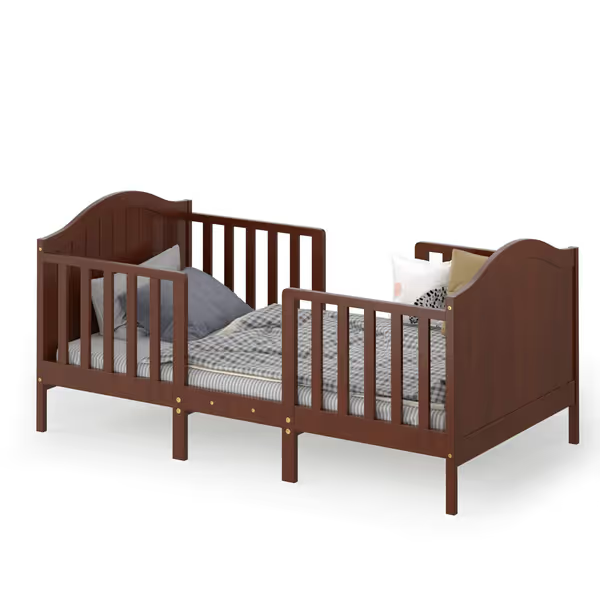
Costzon 2-in-1 Convertible Toddler Bed
2. DHP Isaiah Triple Twin Metal Bunk Bed
For families with two (or soon-to-be three) children sharing tight quarters, the DHP Isaiah Triple Twin Metal Bunk Bed offers remarkable space efficiency. This isn't your childhood bunk bed: we're talking 11.5" full-length guardrails, silent metal construction, and a trundle that tucks away seamlessly. At 62" high, it maintains comfortable ceiling clearance in standard 8-foot rooms while housing three sleepers in the footprint of one.
Why it works for multi-child spaces:
- Vertical space utilization that doubles sleeping capacity
- Trundle storage when not in use for guests
- Metal construction that won't creak with movement
- Modular design that can be reconfigured as children grow
- Rent-friendly assembly with no wall mounting required
Parents of siblings repeatedly share how this configuration eliminated the "middle child" syndrome in shared rooms, each child has their own clearly defined sleep zone without visual barriers. The open design maintains sightlines throughout the room, preventing that cramped feeling common with enclosed bunk setups.
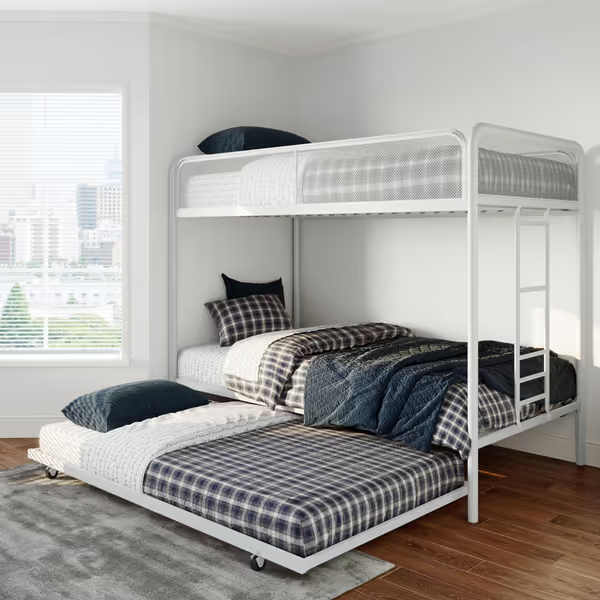
DHP Isaiah Triple Twin Bunk Bed
3. Dream On Me Classic Toddler Bed
This understated workhorse delivers everything essential without excess. The Dream On Me Classic sits just 14" off the ground (the sweet spot for safe independence) and features removable side rails that let you gradually transition from crib to bed. Its smooth wood finish and simple lines make it ideal for parents who favor Scandinavian-inspired minimalism.
Standout features for small rooms:
- Lightweight construction (23 lbs) for easy repositioning
- Standard mattress compatibility (fits crib mattresses perfectly)
- Non-toxic finish that meets strict safety standards
- Sleek profile that visually "recedes" in tight spaces
- One-hour assembly with minimal tools
In my experience, this bed works particularly well for parents transitioning from full-size cribs who need to reclaim that space quickly. The straightforward design creates a calm environment free of visual clutter that often overstimulates toddlers before bed.
4. Delta Children Canton Toddler Bed
For urban parents working with odd-shaped rooms or architectural quirks, the Delta Children Canton Toddler Bed offers versatile solutions. Its minimalist silhouette fits comfortably in room corners or under windows, and the sturdy wood construction ensures longevity through the toddler years. What sets it apart is the thoughtful guardrail design that provides security without creating a "caged" feeling.
Space-savvy advantages:
- Narrow width (only 28") squeezes into tight alcoves
- Low-profile headboard maintains clear sightlines
- Neutral color options blend with existing decor
- Sturdy construction withstands active toddlers
- Easy disassembly for room reconfigurations
I've recommended this bed to countless families living in converted closets or former home offices, they appreciate how it creates a defined sleep zone without overwhelming the space. The low-to-the-ground design aligns beautifully with Montessori principles, inviting children into their own sleep space rather than imposing it upon them.
5. Child Craft Hampton Arch Top Toddler Bed
When durability matters most in high-traffic small spaces, the Child Craft Hampton Arch Top Toddler Bed delivers. Its sturdy wooden construction comes in four neutral colors that enhance calm rather than contribute to visual stimulation. The elevated headboard and footboard create natural boundaries without enclosing the space, while the low-to-the-ground design provides security.
Why it excels in compact layouts:
- Four neutral color options for seamless integration
- Solid wood construction that withstands daily use
- Optimal height (15") for safe independent access
- Classic design that transitions to daybed as child grows
- Minimal assembly requirements (no power tools needed)
Families consistently report how this bed's design supports gentle transitions, the architectural details provide just enough structure to feel secure while maintaining openness. In small bedrooms, this balance between definition and freedom proves invaluable for reducing bedtime resistance.
Creating Your Complete Sleep Environment
A bed is just one element of a space that supports restful sleep. For maximum impact in small bedrooms, consider these environment-enhancing additions:
Strategic Storage Solutions
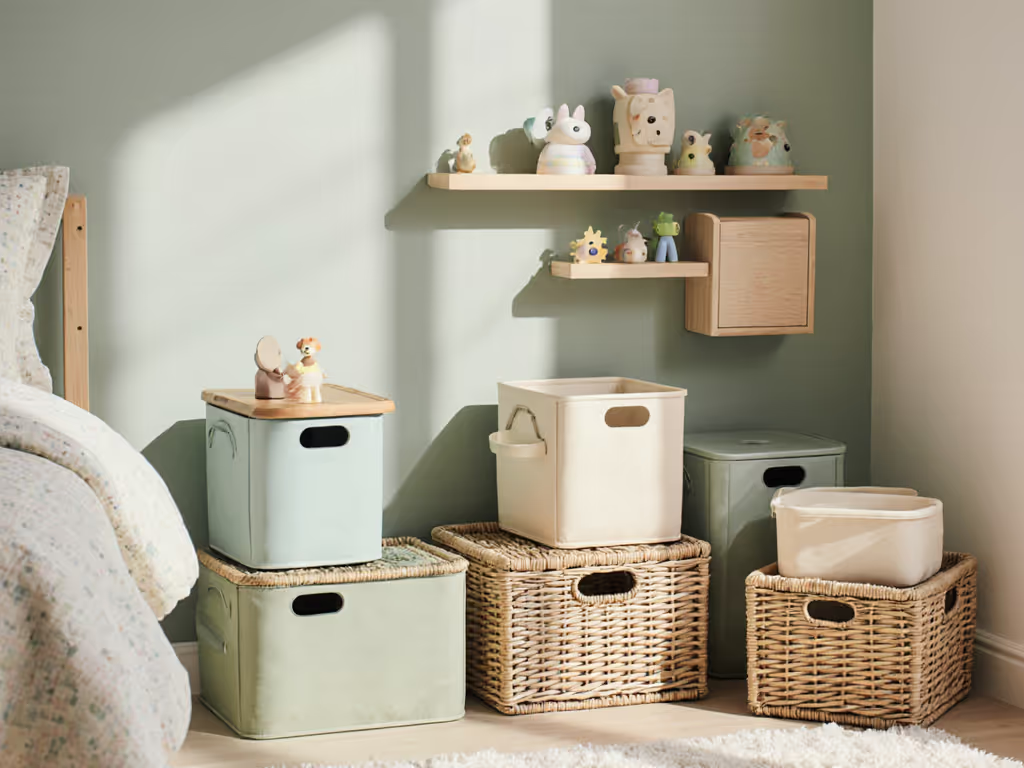
Maximize every inch with:
- Under-bed storage with low-profile bins (max 6" height)
- Wall-mounted shelves above the bed for books and comfort items
- Dual-purpose furniture like storage ottomans that double as seating
Calming Visual Environment
Neutral palettes aren't just stylish (they're functional). Choose:
- Bed frames in natural wood tones or soft whites
- Removable decals instead of paint for renter-friendly personalization
- Fabric elements in muted colors that support relaxation
Pathway Planning
In rooms under 10x10 feet, every inch counts. Create clear pathways by:
- Positioning the bed against the longest wall
- Leaving at least 24" of clearance around the bed
- Using corner configurations when possible
- Choosing furniture with rounded edges for safety
Take Your First Step Toward Calmer Evenings
When you create a space that respects both your square footage limitations and your toddler's developmental needs, something remarkable happens. The nightly battles fade, the protests diminish, and you both reclaim those precious evening hours. Small changes in space create big changes in sleep (that's not just hopeful thinking, it's observed reality in hundreds of homes I've guided).
Your actionable next step: Grab your measuring tape tonight and map your child's bedroom to scale. Note closet swing radii, door placements, and ceiling heights. This simple act shifts you from overwhelmed to empowered, it's the foundation for choosing the right space saving toddler beds for your unique space. Then, compare your measurements against the top options we've reviewed here.
Remember: the right bed isn't just furniture (it's the physical manifestation of your commitment to calm, cooperative sleep). When your toddler's environment teaches behavior through thoughtful design rather than demands, everyone sleeps better. You've got this.
Related Articles

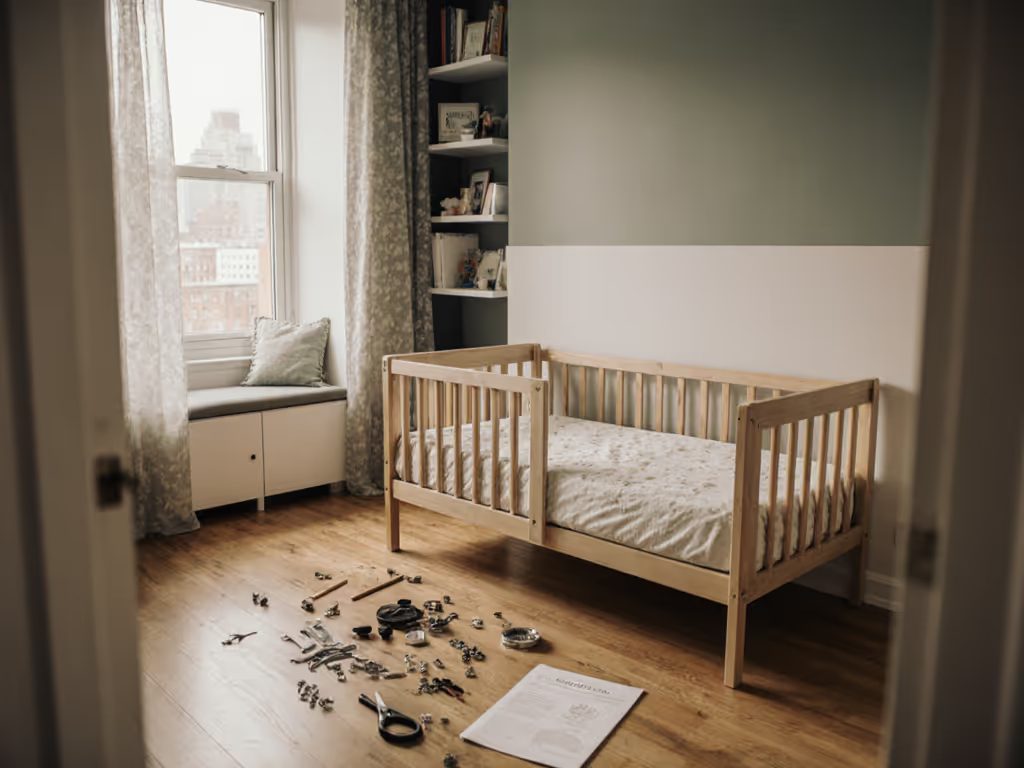
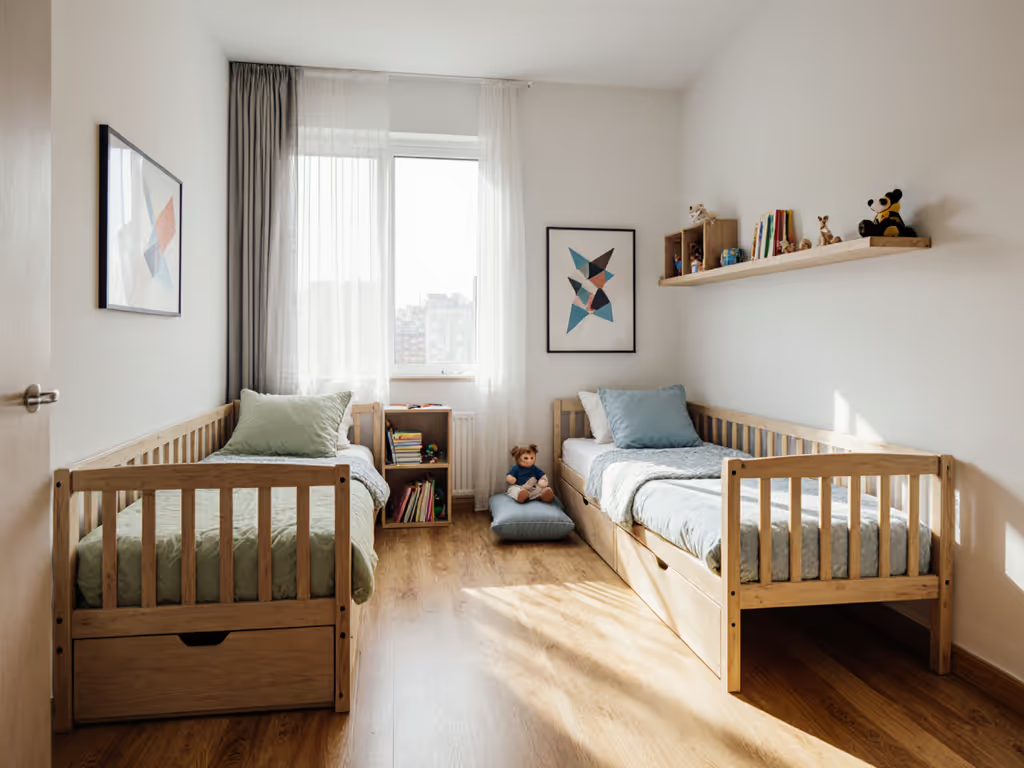
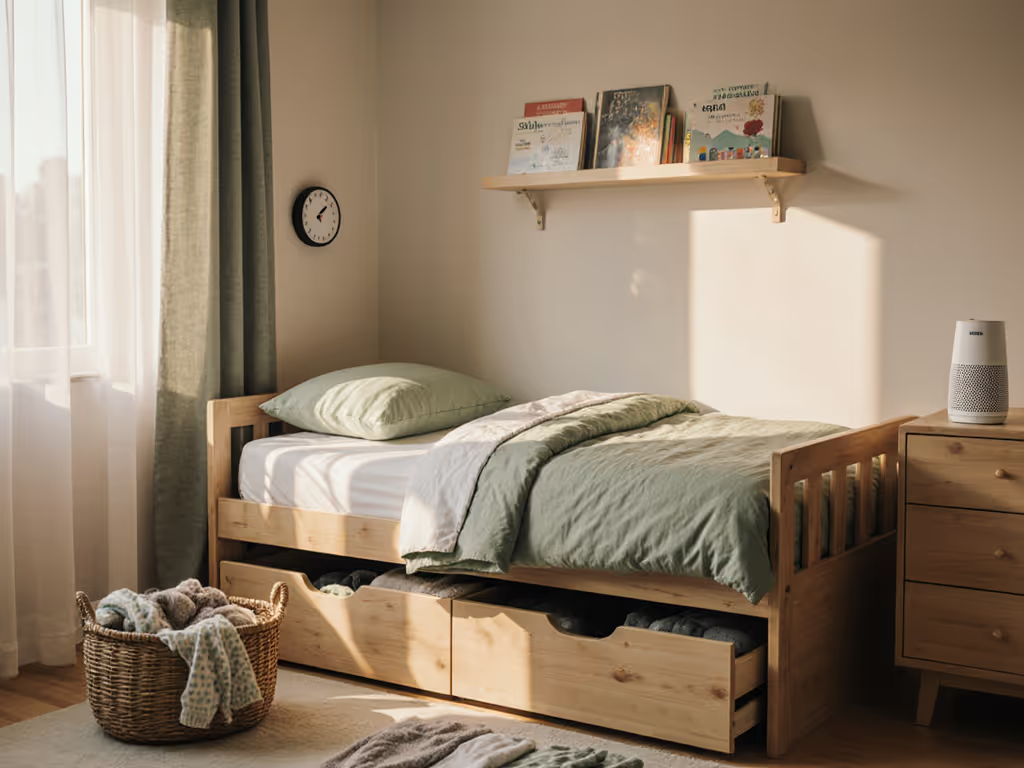
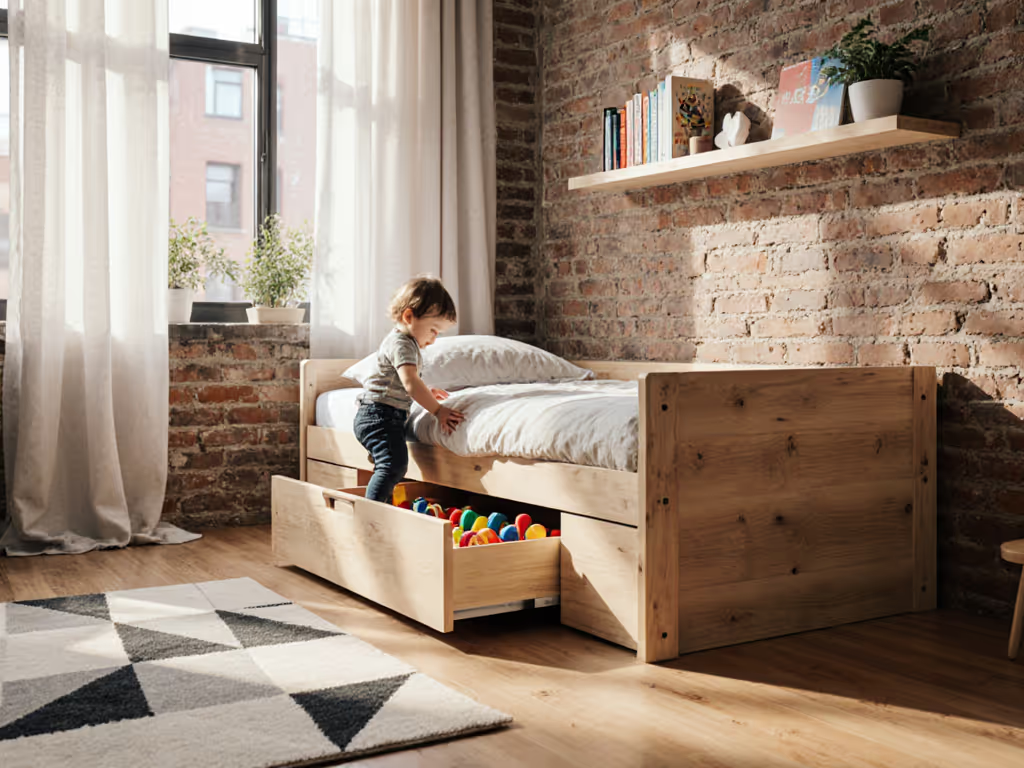
Toddler Storage Beds: Safe Low Heights for Tiny Rooms
Choose small-space toddler beds that balance fall safety, usable storage, and clean air with a minimum 7-inch clearance, verified VOC certifications, and solid-wood options. Get practical alternatives to under-bed drawers plus a simple off-gassing and monitoring plan for healthier sleep in tight rooms.
